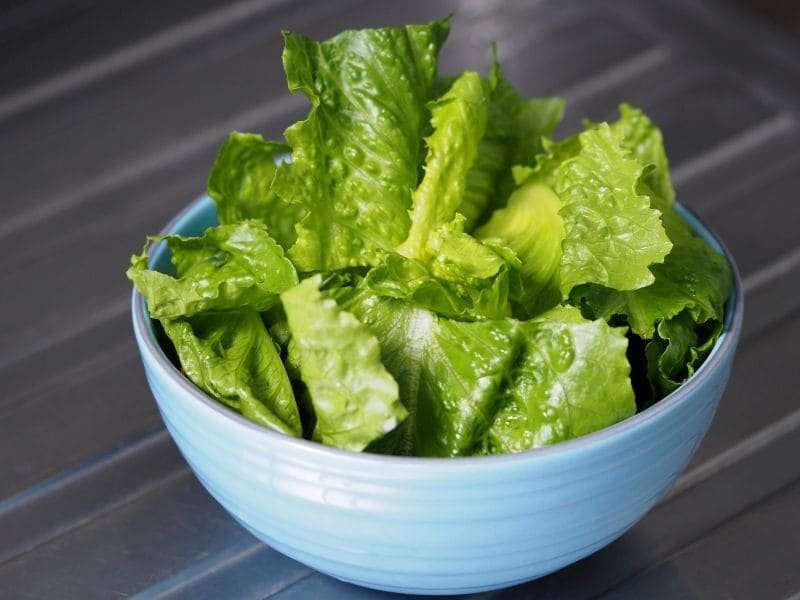Is Caesar Salad Safe Tk Eat Again

(HealthDay)— Caesar salad fans, rest piece of cake: It's safe to eat romaine lettuce again.
Just exist sure to check the label, to avoid any take chances of Due east. coli, the U.S. Nutrient and Drug Administration at present says.
In a statement released tardily Mon, FDA commissioner Dr. Scott Gottlieb announced that the agency was lifting its informational against eating romaine lettuce, first put in identify last Tuesday.
At that point, the agency hadn't been able to narrow down the source of the tainted lettuce, Gottlieb explained. But now the source seems to be "end of season" lettuce, harvested somewhere in the Key Coast regions of central and northern California.
And, "harvesting of romaine lettuce from this region has [already] concluded for the year," Gottlieb noted.
And then, starting as early as this week, romaine lettuce sold in stores will carry labels list the region where the produce was grown, along with its harvest date, the FDA said. By checking these labels, consumers can quickly make up one's mind that the produce is safe to consume.
"Romaine lettuce that was harvested outside of the Central Coast growing regions of northern and central California does not announced to be related to the current outbreak," Gottlieb stressed.
That would include romaine farmed in Arizona, Florida and Mexico, too as California'due south Imperial Valley—lettuce harvested from these areas is OK to eat.
"Hydroponically- and greenhouse-grown romaine also does not appear to be related to the current outbreak," Gottlieb added. "There is no recommendation for consumers or retailers to avoid using romaine harvested from these sources."
If heads of romaine are sold loose, without affixed labels, retailers are beingness asked to post a detect showing place and engagement of harvest near the store register.
Such labeling may become standard going forrard, co-ordinate to an understanding between the FDA and the leafy greens industry, the agency said.
Then far, 43 people beyond 12 states have been sickened in this latest outbreak of Due east. coli, with onset in the last case occurring on Oct. 31.
Xx-two more cases have been reported in Canada. No deaths accept even so been reported in the outbreak.
"Through laboratory studies we take identified that theE. coliO157:H7 strain causing the outbreak is similar to one that produced an outbreak ofE. coliO157:H7 in thefall of 2017 that as well occurred in the U.Due south. and Canada, which was associated with consumption of leafy greens in the U.S. and specifically romaine lettuce in Canada," Gottlieb said.
So who's most at risk from E. coli?
Dr. Robert Glatter is an emergency physician at Lenox Hill Hospital in New York City who's seen the effects of infection with the gastrointestinal bug firsthand. It's non a minor ailment, he said.
"In general, symptoms of Due east. coli infection generally brainstorm near 3 to four days after consuming the bacteria, and may include abdominal cramping, nausea, vomiting, and watery or bloody diarrhea, forth with fever," Glatter said.
And while healthy people who battle a bout of East. coli typically recover inside v to seven days, the disease tin be more protracted—and even deadly—for people already made vulnerable by chronic disease or avant-garde age.
"People with diabetes, kidney disease or those with cancer or autoimmune disease run the risk of a more severe illness," Glatter explained.
The particular strain of Due east. coli detected in the current lettuce outbreak—E. coli O157:H7—is specially nasty, he noted.
"Virtually strains of E. coli practice not actually cause diarrhea, but East. coli O157 produces a powerful toxin that injures the inner lining of the pocket-sized intestine, leading to bloody diarrhea," Glatter said. Even a tiny corporeality of ingested bacteria could spur this type of illness.
"It can make people much more sick, and may lead to hemolytic uremic syndrome, a type of kidney failure, in some cases," he said.
Indeed, the CDC has reported 1 such example already in the latest outbreak.
In many cases, antibiotics are used to help crush back an E. coli infection, but these drugs can affect the kidneys, Glatter noted.
"Antibiotics may exist necessary in certain cases, so it's important to come across your doctor if you take continued and astringent symptoms such equally fever, bloody diarrhea, and you lot are not able to consume or drinkable," he said.
However, in the case of Eastward. coli O157:H7, "taking antibiotics may really increment your chance of developing kidney failure, and so information technology's of import to speak with your health intendance provider if you should develop astringent symptoms," Glatter advised.
And if y'all do recollect you might be sick with E. coli, or any other foodborne affliction, make sure you don't spread it to those well-nigh yous.
The bacterium "tin exist transmitted person-to-person, and so it's vital that anyone who is potentially infected wash their hands thoroughly and not share utensils, cups or spectacles," Glatter said. "This also goes for bath towels. Linens also need to be washed in hot water and treated with bleach."
He noted that "ground beef, unpasteurized milk, fresh produce and contaminated water are common sources of E. coli leaner."
More information: Find out more about E. coli affliction at the U.South. Centers for Disease Command and Prevention.
Copyright © 2018 HealthDay. All rights reserved.
Citation: It's safe to eat romaine lettuce again, but check labels: FDA (2018, Nov 27) retrieved 15 May 2022 from https://medicalxpress.com/news/2018-xi-safe-romaine-lettuce-fda.html
This document is subject to copyright. Apart from any fair dealing for the purpose of private study or research, no part may be reproduced without the written permission. The content is provided for information purposes only.
Source: https://medicalxpress.com/news/2018-11-safe-romaine-lettuce-fda.html#:~:text=(HealthDay)%E2%80%94%20Caesar%20salad%20fans,and%20Drug%20Administration%20now%20says.